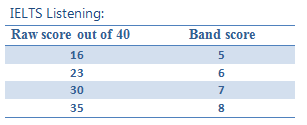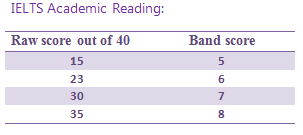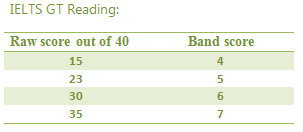How IELTS is Scored?
- Details
- Last Updated: Sunday, 27 July 2025 15:11
- Written by IELTS Mentor
- Hits: 173075
IELTS test results are prepared on a nine-band scale. In addition to the score for overall language ability, IELTS provides a score in the form of a profile for each of the four skills (Listening, Reading, Writing and Speaking).These scores are also reported on a nine-band scale. Each Overall Band Score corresponds to a descriptive statement which gives a summary of the English language ability of a candidate classified at that level. The nine bands and their descriptive statements are as follows:
9 Expert User
Has fully operational command of the language: appropriate, accurate and fluent with complete understanding.
8 Very Good User
Has fully operational command of the language with only occasional unsystematic inaccuracies and inappropriacies. Misunderstandings may occur in unfamiliar situations. Handles complex detailed argumentation well.
7 Good User
Has operational command of the language, though with occasional inaccuracies, inappropriateness and misunderstandings in some situations. Generally handles complex language well and understands detailed reasoning.
6 Competent User
Has generally effective command of the language despite some inaccuracies, inappropriacies and misunderstandings. Can use and understand fairly complex language, particularly in familiar situations.
5 Modest User
Has a partial command of the language, coping with overall meaning in most situations, though is likely to make many mistakes. The candidate should be able to handle communication in his or her own field.
4 Limited User
Basic competence is limited to familiar situations. Has frequent problems in understanding and expression. Is not able to use complex language.
3 Extremely Limited User
Conveys and understands only general meaning in very familiar situations. Frequent breakdowns in communication occur.
2 Intermittent User
No real communication is possible except for the most basic information using isolated words or short formulae in familiar situations and to meet immediate needs. Has great difficulty understanding spoken and written English.
1 Non User
Essentially has no ability to use the language beyond possibly a few isolated words.
0 Did not Attempt The test
No accessible information provided.
Half and Whole band score explained:
You can score whole (e.g., 5.0, 6.0, 7.0, 8.0) or half (e.g., 5.5, 6.5, 7.5, 8.5) bands in each part of the test. There is no Pass or Fail mark in IELTS. Your overall band score and individual band score in each section provides assessment of your overall and individual (listening, reading, writing, and speaking) skill and command on the language. Four individual scores in four sections of IELTS are averaged and rounded to produce an Overall Band Score. Overall Band Scores and scores for each sub-test are reported in whole bands or half bands.
Some of you might have a wrong perception about the half and full band scores and their rounding conversion. A candidate scores either full band (5.0, 7.0 etc.) or half band (5.5, 7.5 etc). So now if someone scores 6.5, 6.0 6.5 & 6.0 in four sections, his overall band score calculation would be:
6.5+6.0+6.5+6.0 = 25, which will be divided by 4. 25/4 = 6.25. Now 6.25 will be rounded up to the next half band score, which is 6.5.
If someone scores 7.0, 7.5, 6.5 & 6.0 in four sections, is total will be divided by 4 (27/4) which is 6.75. The overall band score, in this case, will be rounded up to next whole band score which is 7.0.
To make it even clearer look at the following scenario:
A test taker scored 4.0 in listening, 3.5 in reading, 4.0 in writing and 4.0 in speaking would get 4.0 band score because 4.0+3.5+4.0+4.0= 15.5. Now 15.5/4= 3.875. Since 3.875 is rounded up to the next whole band score 4.0, his overall score will be 4.0.
In the following case the rounding down will be applied:
Candidates achieved 6.5 for Listening, 6.5 for Reading, 5.5 for Writing and 6.0 for Speaking. He will be in this case awarded band 6 (24.5 ÷ 4 = 6.125 = Band 6).
By now your idea about the half and full-band score on IELTS test should be very clear.
How IELTS Listening module is scored:
IELTS Listening test comes with around 40 questions. Each correct answer is awarded a raw score 1. Thus if there are 40 questions in listening test, a candidate can score maximum 40. A standard raw score converter table is given so that you can get a good idea how many correct answers you need to achieve your desired band score.

Your raw score is converted to a band score and this band score is reported in your result.
How IELTS Academic Reading module is scored:
IELTS Academic Reading module has about 40 questions. Like the listening module, the raw score is calculated first and then this is converted into the band score. The following table depicts the number of correct answers you need to get your desired band score.

How IELTS GT Reading module is scored:
This process is quite similar to the process of scoring for Academic reading except that the raw score to band score conversion follows a very slightly different figure. The raw score and its corresponding band score conversion chart are given below:

How IELTS Writing module is scored:
The assessment for IELTS writing (both academic and General training) is done by professional and trained teachers. 4 criteria are assessed in IELTS writing. The examiner awards band score for each of the four criterion areas and then an average is calculated to reward the final band score.
Assessment criteria for Task 1 (both academic and general training):
- Task Achievement.
- Coherence and Cohesion.
- Lexical Resource.
- Grammatical Range and Accuracy.
(These four criteria have equal weighted. )
Assessment criteria for Task 2 (both academic and general training):
- Task Response.
- Coherence and Cohesion.
- Lexical Resource.
- Grammatical Range and Accuracy.
( These four criteria have equal weighted.)
How IELTS Speaking module is scored:
The speaking examiner tests four criteria while you speak: Fluency and Coherence, Lexical Resource, Grammatical Range and Accuracy and Pronunciation. All these four criteria weight equally. A band score is assigned to for each of the criteria and the average of it is the band score in your speaking sub-test. Your conversation is recorded and a second examiner listens to this conversation and awards a band score. The average of these two band score is your final band score in your speaking test.
Details Score Conversion Table:
This table is a general guide only. Sometimes the scores are adjusted slightly depending on the difficulty level of a test.

Use our brand new IELTS Calculator to interpret your IETLS Band score:
The IELTS score calculator enables you to calculate your overall band score, Academic and General Training Listening & Reading band score and also enables you to target your band score by showing how many correct answers you need for achieve a target band score.
Click IELTS Band Calculator and interpret your score right now.

Report